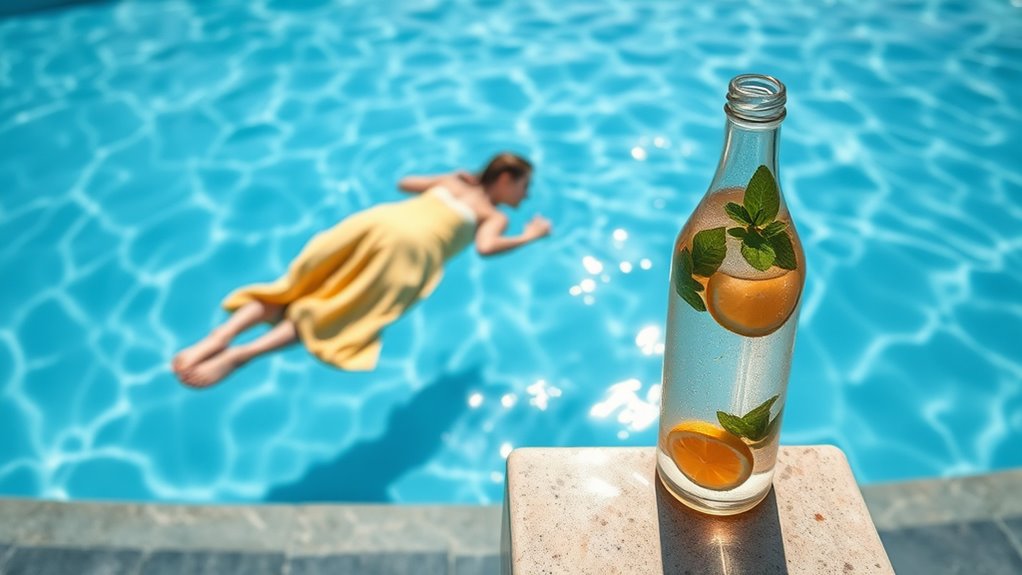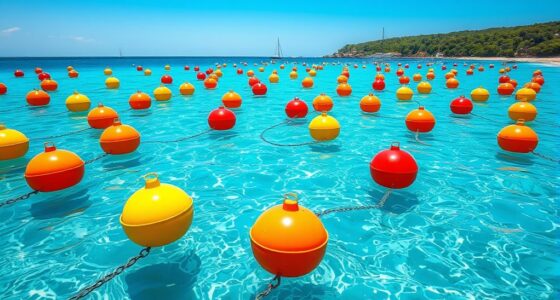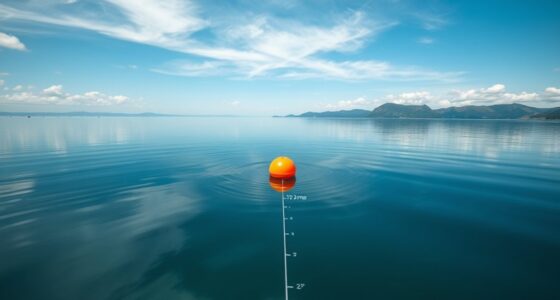To stay hydrated while floating, keep a water bottle or electrolyte drink nearby and take regular sips to prevent dehydration. Wear protective gear like hats, sunglasses, and sunscreen, and take breaks in shaded areas to stay cool. Listen to your body for signs of dehydration, such as dry mouth or dizziness, and avoid alcohol or caffeine. Staying aware of your hydration needs guarantees a safe and enjoyable experience—see how to optimize this even further.
Key Takeaways
- Keep a leak-proof water bottle or hydration pack within reach for easy sipping during your float.
- Regularly drink water and electrolyte beverages to replenish fluids and maintain electrolyte balance.
- Avoid alcohol and caffeine, as they can cause dehydration and safety risks while floating.
- Watch for signs of dehydration like dizziness or dry mouth and increase fluid intake promptly.
- Take breaks in shaded areas and wear sun protection to reduce heat stress and support hydration.

Ever wonder how to stay hydrated while floating on water or in a relaxing pool? It might seem effortless to just lounge and soak up the sun, but dehydration can sneak up on you even when you’re surrounded by water. That’s why knowing some simple hydration tips is vital to keep yourself feeling energized and safe. When you’re floating, it’s easy to forget to drink enough fluids, especially because you might not feel thirsty as quickly. So, planning ahead with hydration in mind becomes key to enjoying your time without worry.
First, make sure to have a water bottle nearby at all times. Opt for a leak-proof container so you can sip regularly without hassle. Keep it close enough that you can reach it easily, whether you’re lying on a float or sitting on a pool chair. Remember, even if you don’t feel thirsty, your body still needs fluids to replace what’s lost through sweat and evaporation. Carrying a hydration pack or water bottle ensures you’re reminded to take small sips frequently, preventing dehydration before symptoms become noticeable.
Keep a leak-proof water bottle nearby and sip regularly to stay hydrated while floating.
In addition to drinking water, consider incorporating electrolyte drinks if you’re planning to stay in the sun for long periods. These drinks help replenish essential minerals lost through sweating, keeping your body balanced and functioning properly. Just be mindful of added sugars or artificial ingredients; choose options that are low in sugar and made with natural ingredients when possible. Staying hydrated isn’t just about drinking water; it’s about maintaining your overall fluid and electrolyte levels, especially during extended periods of relaxation in the sun.
Floatation safety also plays a vital role in hydration. When you’re floating, it’s easy to become complacent and forget to hydrate regularly. Keep an eye on your hydration habits and listen to your body. Feeling dizzy, fatigued, or experiencing dry mouth are signs you need to up your fluid intake immediately. Avoid alcohol or caffeine while floating, as these can dehydrate you further and compromise your floatation safety. To support your hydration efforts, it’s helpful to understand the importance of evidence-based insights in preventing dehydration and maintaining overall well-being. Instead, focus on steady hydration to keep your body cool and your mind alert.
Lastly, be cautious about overexposure to the sun. Wear a hat, sunglasses, and sunscreen to minimize heat stress, which can increase your fluid needs. Take breaks in shaded areas and hydrate consistently, especially if you notice yourself starting to feel overheated. By combining smart hydration tips with attentive floatation safety, you can enjoy your floating experience worry-free, feeling refreshed and well-hydrated throughout your relaxing day on the water.
Frequently Asked Questions
Can Floating Cause Dehydration?
Floating itself doesn’t cause dehydration, but it can contribute if you’re not mindful of hydration myths. During floatation therapy, you might forget to drink water because of relaxation, leading to dehydration. To stay properly hydrated, drink plenty of water before and after your session. Remember, floating is a calming experience, but staying hydrated is essential to avoid dehydration and maximize the benefits of your float.
What Drinks Are Best During Floating Sessions?
You should opt for hydrating beverages like water or electrolyte options during floating sessions. Ironically, the drinks you choose matter more than you might think—plain water is great, but electrolyte-rich drinks help replenish lost minerals and keep you energized. So, skip sugary sodas or caffeinated beverages; instead, focus on hydration-focused options to stay balanced and comfortable while floating.
How Often Should I Hydrate While Floating?
You should hydrate regularly during your floating session, ideally every 15 to 20 minutes, depending on your floating duration. Keep an eye on your hydration timing to prevent dehydration, especially if your session lasts longer. Drinking small sips of water or electrolyte beverages throughout helps maintain hydration levels and keeps you comfortable. Listen to your body’s signals, and don’t wait until you’re thirsty to hydrate.
Are There Signs of Dehydration to Watch For?
Think of dehydration signs like warning signals on a ship. You might notice dizziness, dry mouth, or muscle cramps, which suggest electrolyte imbalance. If you feel tired or have dark urine, it’s time to reassess your hydration tips. Staying alert to these symptoms helps prevent dehydration, especially during floating sessions. Keep a water or electrolyte beverage nearby, and listen to your body’s signals to stay safe and well-hydrated.
Does Floating Affect Electrolyte Balance?
Floating can impact your electrolyte balance because it often involves sweating and fluid loss. To counter this, you should prioritize electrolyte replenishment through sports drinks or electrolyte tablets. Hydration strategies like drinking water regularly and consuming electrolyte-rich foods help maintain your balance. Keep an eye on signs of imbalance, and adjust your intake accordingly to stay properly hydrated and avoid dehydration during floating activities.
Conclusion
Staying hydrated while floating keeps you refreshed and ready for adventure, whether you’re on a river or a vintage steamboat. Remember to carry water or electrolyte drinks, sip regularly, and avoid overexposure to the sun. Just like sailors of old, you’ll want to be mindful of your body’s signals. So, keep your flask handy and sip steadily—before you know it, you’ll be floating like a modern-day mermaid, cool and collected, no matter where your journey takes you.










